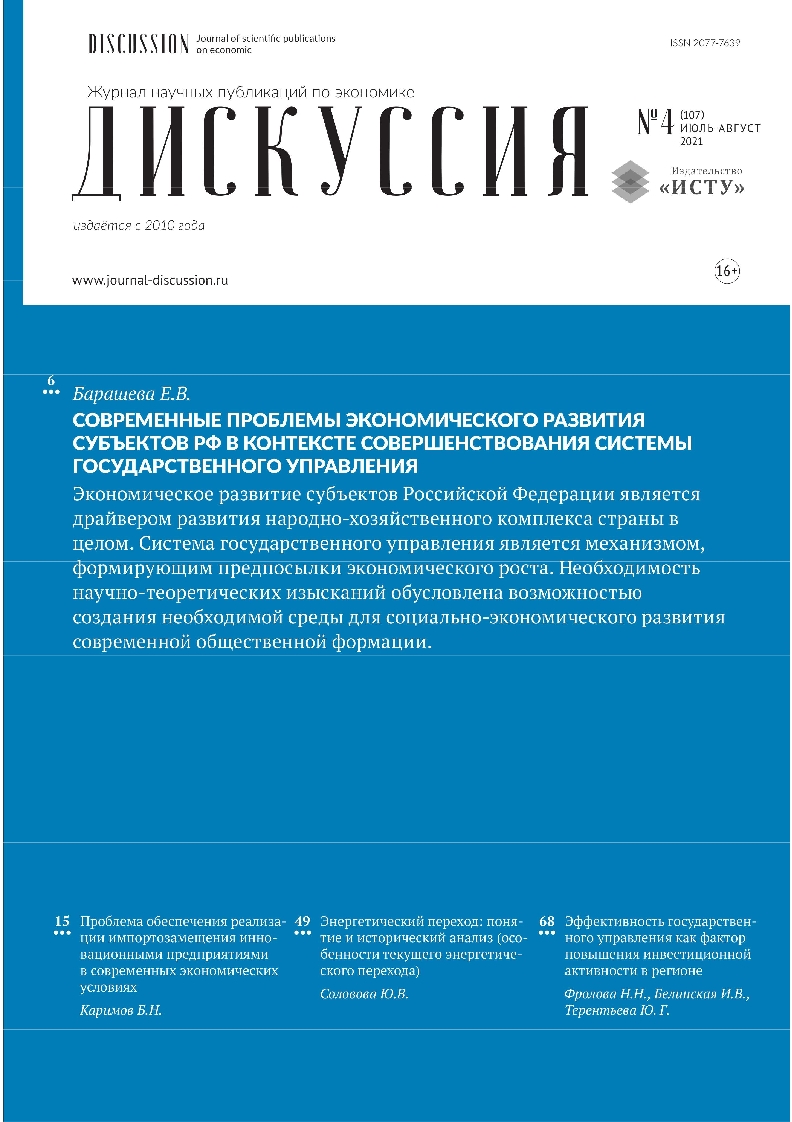Transformations of the world energy system in the context of the energy transition trend
Abstract
The use of energy is an indispensable condition for the development of civilization. Along-side economic development, emergence of new forms of energy and technologies for its use, there are shifts in the energy balance. We currently witness acceleration of energy transition trends, assuming an increased role of low-carbon energy in the context of climate change threat, which is a significant factor of uncertainty in world energy markets. The authors present a historical analysis based on the study of past energy transitions, which can provide a basis for a better understanding of the potential for changes in the energy mix and their possible dynamics during the current energy transition. In addition, the authors review the significant features of the current energy transition and the key factors that predetermine transformational changes.
Downloads
Metrics
References
Peter J. G. Pearson, "Past, present and prospective energy transitions: an invitation to historians", Journal of Energy History/Revue d'Histoire de l'Énergie [Online], n 1, December 2018.
Smil Vaclav, Energy Transitions: History, Requirements, Prospects (Santa Barbara, CA: Praeger, 2010)
Shove Elisabeth, Walker Gordon, “CAUTION! transitions ahead: politics, practice and sustainable transition management”, Environment and Planning, vol. 39, 2007.
O’Connor, P. A. (2010). ‘Energy Transitions’. The Pardee Papers, No. 12. Boston: Boston University, The Frederick S. Pardee Center for the Study of the Longer-Range Future.
Mumford L. Technics and civilization. University of Chicago Press; 2010.
Laird Frank N., “Against transitions? Uncovering conflicts in changing energy systems”, Science as Culture, vol. 22/2, 2013.
Krause, Bossel, Müller-Reißmann: Energiewende – Wachstum und Wohlstand ohne Erdöl und Uran, S. Fischer Verlag 1980.
OSCE (2013) Energy Concept for an Environmentally Sound, Reliable and Affordable Energy Supply, Germany’s Federal Ministry of Economics and Technology, Federal Ministry for the Environment, Nature Conservation and Nuclear Safety, 24 April 2013.
Gales, B., Kander, A., Malanima, P., Rubio, M.d.M., (2007) North vs South: Energy Transition and Energy Intensity in Europe over 200 years. European Review of Economic History 11(2) 219-53.
Roger (2016) Historical energy transitions: speed, prices and system transformation. Energy Research & Social Science, 22. pp. 7-12.
Global Energy Assessment (GEA) (2012). Global Energy Assessment—Toward a Sustainable Future. Cambridge and New York: Cambridge University Press.
Myhrvold, N. P. and K. Caldeira (2012). ‘Greenhouse Gases, Climate Change and the Transition from Coal to Low-Carbon Electricity’. Environ. Res. Lett.,
Smil, V. (2010). Energy Myths and Realities: Bringing Science to the Energy Policy Debate. Washington, DC: Rowman and Littlefield.
Lund, P. (2006). ‘Market Penetration Rates of New Energy Technologies’. Energy Policy, 34: 3317–26.
Lund, P. (2010). ‘Exploring Past Energy Changes and Their Implications for the Pace of Penetration of New Energy Technologies’. Energy, 35: 647–56.
Fouquet, R. (2010). ‘The Slow Search for Solutions: Lessons from Historical Energy Transitions by Sector and Service’. Energy Policy, 38(11): 6586–96.
Pearson P.J.G. (2018) Energy Transitions. In: Macmillan Publishers Ltd (eds) The New Palgrave Dictionary of Economics. Palgrave Macmillan, London
Sovacool, B. K. (2016). ‘How Long Will It Take? Conceptualizing the Temporal Dynamics of Energy Transitions’. Energy Research & Social Science, 13: 202–15.
Knox-Hayes, J. (2012). ‘Negotiating Climate Legislation: Policy Path Dependence and Coalition Stabilization’. Regulation & Governance, 6(4): 545–67.
Goldthau, A. and B. K. Sovacool (2012). ‘The Uniqueness of the Energy Security, Justice, and Governance Problem’. Energy Policy, 41: 232–40.
Benjamin K. Sovacool, The History and Politics of Energy Transitions. Comparing Contested Views and Finding Common Ground, in The Political Economy of Clean Energy Transitions, Douglas Arent, Channing Arndt, Mackay Miller, Finn Tarp, and Owen Zinaman, 2017.
Kern, Florian, and Jochen Markard. 2016. Analysing energy transitions: Combining insights from transitions studies and international political economy. In The Palgrave Handbook of the International Political Economy of Energy edited by T. Van de Graaf, B. Sovacool, A. Ghosh, F. Kern and M. Klare. Basingstoke: Palgrave, 391-429.
Pratt, J. A. (1981). ‘The Ascent of Oil: The Transition from Coal to Oil in Early Twentieth-Century America’. In L. J. Perelman, A. W. Giebelhaus, and M. D. Yokel (eds), Energy Transitions: Long-Term Perspectives. Boulder, CO: AAAS. Стр. 9-34.
Бдоян Д.Г. Российско-турецкие отношения в сфере энергетики // В сборнике: Россия в новых международно-политических условиях. сборник работ молодых ученых. Москва, 2017. С. 107-114.
Karapetyan M.E., Pronina I.V., Timoshenko L.P., Prusakova D.A. Ethical dilemma in an investment banking // Innovation & Investment. 2020. № 5. С.161-164.
Downloads
Published
How to Cite
Issue
Section
Categories
License
Copyright (c) 2021 Ю.В. Соловова

This work is licensed under a Creative Commons Attribution-NonCommercial-NoDerivatives 4.0 International License.
Авторы, публикующие произведения в журнале «Дискуссия», соглашаются со следующими условиями:
- Авторы сохраняют за собой авторское право и предоставляют журналу право первой публикации произведения, одновременно лицензированной в соответствии с лицензией Creative Commons Attribution, позволяющей другим лицам пользоваться произведением с подтверждением авторства и первоначальной публикации в журнале «Дискуссия».
- Авторы вправе заключать с иными лицами лицензионные договоры на условиях простой (неисключительной) лицензии на использование опубликованного в журнале «Дискуссия» произведения (например, размещение его в базах данных университетов, публикация в книге), со ссылкой на его оригинальную публикацию в этом журнале.
- Автор гарантирует, что является правообладателем всех материалов, предоставляемых в редакцию, и что исключительные права на данные материалы не переданы или не предоставлены другим лицам.
- Авторам разрешено и рекомендуется размещать свое произведение в Интернете до и во время процесса подачи, поскольку это может привести к продуктивному обмену, а также к более раннему и более широкому цитированию опубликованных работ.
С момента загрузки произведения и сопроводительных материалов через раздел "Отправка материалов", автор полностью и безоговорочно принимает (акцептует) публичную оферту о заключении авторского соглашения об опубликовании произведения. В соотвтетствии с этим соглашением автор предоставляет издателю на безвозмездной основе неисключительную лицензию на использование созданного автором произведения.
С момента получения произведения и прилагаемых к нему материалов журнал "Дискуссия" вправе использовать полученные произведения без ограничений по своему усмотрению и в пределах всего срока действия исключительных прав, но с обязательным указанием имени автора (авторов) произведения, в том числе публиковать произведения (полностью или в сокращении) на территории всего мира, переводить на другие языки, направлять в репозитории научной информации, размещать в сети Интернет и использовать другими законными способами.









